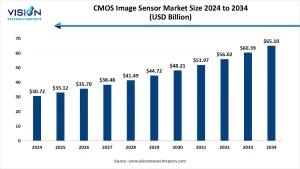The global CMOS image sensor market size was valued at around USD 30.72 billion in 2024 and it is projected to hit around USD 65.10 billion by 2034, growing at a CAGR of 7.80% from 2025 to 2034.

Get a Sample@https://www.visionresearchreports.com/report/sample/41743
CMOS Image Sensor Market Overview
The CMOS (Complementary Metal-Oxide Semiconductor) image sensor market has witnessed a significant transformation over the past decade, driven by advancements in imaging technologies and the expanding application base across various industries. In 2024, the global CMOS image sensor market was valued at approximately USD 30.72 billion and is poised to reach an estimated USD 65.10 billion by 2034, reflecting a robust CAGR of 7.80% from 2025 to 2034. The rising demand for high-resolution image capturing in smartphones, automotive safety systems, surveillance, and medical imaging has been a key contributor to this impressive growth trajectory.
CMOS Image Sensor Market Growth
The widespread adoption of CMOS image sensors in consumer electronics, especially in smartphones and digital cameras, is one of the most powerful growth drivers. Modern consumers increasingly seek enhanced photography experiences, low-light performance, and AI-integrated camera capabilities, compelling manufacturers to integrate advanced image sensors into their devices. As a result, leading tech firms are investing heavily in sensor development, pushing the performance boundaries of CMOS technology.
Furthermore, the automotive sector has become an emerging hotspot for CMOS image sensor adoption. With the proliferation of ADAS (Advanced Driver Assistance Systems), lane departure warnings, and autonomous driving technologies, image sensors play a crucial role in real-time environment detection. This ongoing transformation in mobility, coupled with stringent safety regulations, is set to amplify demand for CMOS sensors over the coming years.
CMOS Image Sensor Market Dynamics
Drivers
The global CMOS image sensor market is largely driven by the surging use of smartphones, which require high-quality, compact, and energy-efficient imaging systems. With smartphone manufacturers constantly enhancing camera capabilities through multi-lens setups and AI-driven photography features, the demand for advanced CMOS sensors has skyrocketed. Additionally, the rising implementation of Advanced Driver-Assistance Systems (ADAS) in modern vehicles such as lane departure warning, automatic braking, and pedestrian detection is fueling the need for high-resolution and high-speed CMOS sensors.
Opportunity
There are immense growth opportunities emerging from the integration of CMOS sensors into next-generation technologies. In AR/VR devices, CMOS sensors support immersive experiences through spatial recognition and eye-tracking. Similarly, drones require lightweight, high-performance image sensors for navigation, object detection, and aerial photography. Biometric security systems, including facial recognition, iris scanning, and gesture-based access control, are also expanding applications for CMOS image sensors in both consumer electronics and enterprise solutions.
Challenges
Despite promising growth, the market faces several challenges. One of the major concerns is the ongoing competition with CCD Charge-Coupled Device sensors in specialized fields such as scientific imaging, where CCDs offer better sensitivity and image quality under low-light conditions. Additionally, CMOS sensor manufacturing involves complex fabrication processes that demand significant capital investment and technical expertise.
Applications in the Market
CMOS image sensors are widely used in smartphones, digital cameras, automotive safety systems, industrial machine vision, medical diagnostics, surveillance equipment, and consumer electronics. In healthcare, they enable compact diagnostic devices and endoscopic imaging. In the automotive sector, they support driver monitoring and object detection. In consumer electronics, these sensors continue to evolve in terms of speed, clarity, and adaptability for dynamic environments.
Case Study Sony’s CMOS Image Sensor Leadership
Sony has maintained a dominant position in the global CMOS image sensor market due to its technological innovation and strategic partnerships. For instance, Sony’s Exmor RS sensors, which offer high dynamic range and superior low-light performance, have been widely adopted in leading smartphones. The company’s investment in 3D sensing and AI-integrated chips has further strengthened its portfolio, supporting applications in both mobile and automotive markets. This case highlights how innovation and R&D investment can secure a long-term competitive edge in the evolving CMOS sensor landscape.
CMOS Image Sensor Market Trends
- Integration with AI and Edge Computing: CMOS image sensors are increasingly being integrated with AI algorithms and edge computing to enable real-time image processing, especially in autonomous vehicles, security cameras, and smart appliances.
- Miniaturization and Power Efficiency: Manufacturers are focusing on producing smaller, more energy-efficient sensors without compromising performance, especially for use in wearables and compact medical imaging devices.
- Advancements in 3D Sensing: The growth of facial recognition systems, augmented reality, and gesture-based user interfaces is accelerating the development of CMOS sensors with 3D imaging capabilities.
- Increased Use in Industrial Automation: The demand for machine vision systems in manufacturing and robotics is rising, encouraging the use of CMOS sensors for tasks such as defect detection, measurement, and positioning.
Read More:https://www.heathcareinsights.com/regenerative-medicine-market/
Top Companies in CMOS Image Sensor Market
- Sony Group Corporation
- Samsung Electronics Co., Ltd.
- OmniVision Technologies, Inc.
- ON Semiconductor Corporation
- STMicroelectronics N.V.
- Canon Inc.
- Panasonic Corporation
- SK Hynix Inc.
- GalaxyCore Inc.
- Teledyne Technologies Incorporated
Market segments
- By Technology: Front-side illumination (FSI), Back-side illumination (BSI), Stacked CMOS
- By Resolution: HD, Full HD, 4K, 8K and above
- By End-user: Consumer Electronics, Automotive, Security & Surveillance, Healthcare, Industrial, Aerospace & Defense
- By Region: North America, Europe, Asia Pacific, Latin America, Middle East & Africa
Future Outlook
The future of the CMOS image sensor market looks promising, with technological innovation and diversification of application areas at its core. As the world continues to embrace smart technologies, automation, and AI, CMOS sensors will remain integral to enabling seamless imaging experiences. Enhanced sensor capabilities, integration with AI, and increased deployment across industries are expected to unlock new growth frontiers. Between 2025 and 2034, the market is set to flourish, driven by ongoing innovation and the surging demand for intelligent imaging solutions.
Buy this Premium Research Report@https://www.visionresearchreports.com/report/checkout/41743
You can place an order or ask any questions, please feel free to contact
sales@visionresearchreports.com| +1 650-460-3308
